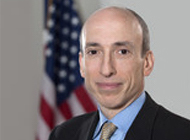 The Senate has now approved President Biden’s nominee to chair the Securities and Exchange Commission, setting the stage for a shift in power—but there is a minor catch.
The Senate has now approved President Biden’s nominee to chair the Securities and Exchange Commission, setting the stage for a shift in power—but there is a minor catch.
The full Senate approved Gary Gensler’s nomination to be Chairman of the SEC on April 14 by a 53-45 margin. However, the approval applies only to the remainder of former Chairman Jay Clayton’s term, which expires in June. Republican Sens. Charles Grassley (IA), Susan Collins (ME) and Cynthia Lummis (WY) voted in support of the nomination.
Gensler had been approved by the Senate Banking, Housing and Urban Affairs Committee to serve out the remainder of Clayton’s term and be reappointed to a new, five-year term expiring June 5, 2026. The incoming Chairman will still be able to serve an additional 18 months past the term if a successor has not been confirmed, as the SEC rules allow. Since President Biden has already nominated Gensler to serve a full five-year term, the Senate will have to vote on that nomination separately in the future.
Changing of the Guard
Once Gensler is sworn in, that will shift the power structure of the Commission to three Democrats (Gensler, Allison Herren Lee and Caroline Crenshaw) to two Republicans (Hester Peirce and Elad Roisman).
The incoming chairman is expected to bring a strong enforcement focus to the Commission. Gensler was chairman of the U.S. Commodity Futures Trading Commission (CFTC) from 2009 to 2014, where he led reforms of the $400 trillion swap trading market, implementing stringent new trading rules mandated by the Dodd-Frank Act following the 2008 financial crisis.
Gensler also led the CFTC as it brought charges against five financial institutions for the manipulation of LIBOR and other benchmark interest rates, resulting in billions of dollars in penalties. Additionally, he was a senior advisor to former Sen. Paul Sarbanes (D-MD), helping to write the Sarbanes-Oxley Act in 2002, which reformed corporate responsibility, accounting and securities laws.
Regulatory Focus
Gensler has not publicly stated whether he will seek to revisit the Commission’s Regulation Best Interest, but he will probably face pressure from congressional Democrats to do so.
One key revelation from his March 2 nomination hearing was that he planned to seek additional guidance on climate risk disclosures in public company filings. And this would be consistent with recent actions taken by Acting Chair Allison Herren Lee, who announced in March that the Commission was undertaking a review of how it can best regulate and guide climate change disclosures, citing an increase in demand from investors.
Gensler also indicated at his hearing that he wants to get a better understanding of the recently finalized rules addressing proxy advisory firms. Similarly, he noted that he believes Bitcoin and other cryptocurrencies have brought new thinking to payments and financial inclusion, but they’ve also raised new issues of investor protection that still may need to be addressed, when asked about the regulation of cryptocurrencies.
To get a sense of the congressional undercurrents regarding his nomination, consider two statements from the Chairman and Ranking Republican of the Senate Banking Committee. “Mr. Gensler will listen to families saving for the future, as well as the professionals who manage workers’ pensions and retirements. And, he will make sure that savers—large and small—can hold corporate executives accountable,” stated Committee Chairman Sherrod Brown (D-OH). “When it comes to enforcement, Mr. Gensler has shown he will take on bad actors—no matter how big and powerful they are—and hold them accountable.”
In contrast, Sen. Pat Toomey (R-PA), the ranking Republican on the Committee, stated that Gensler “certainly has a great deal of knowledge about the securities markets. However, based on his record and statements during the nomination process, I’m concerned he will cause the SEC to use its regulatory powers to advance a liberal social agenda focused on issues such as global warming, political spending disclosures, and racial inequality and diversity.”
Gensler served most recently as a Professor of the Practice of Global Economics and Management at the MIT Sloan School of Management, where he has conducted research and taught on blockchain technology, digital currencies, financial technology and public policy.

